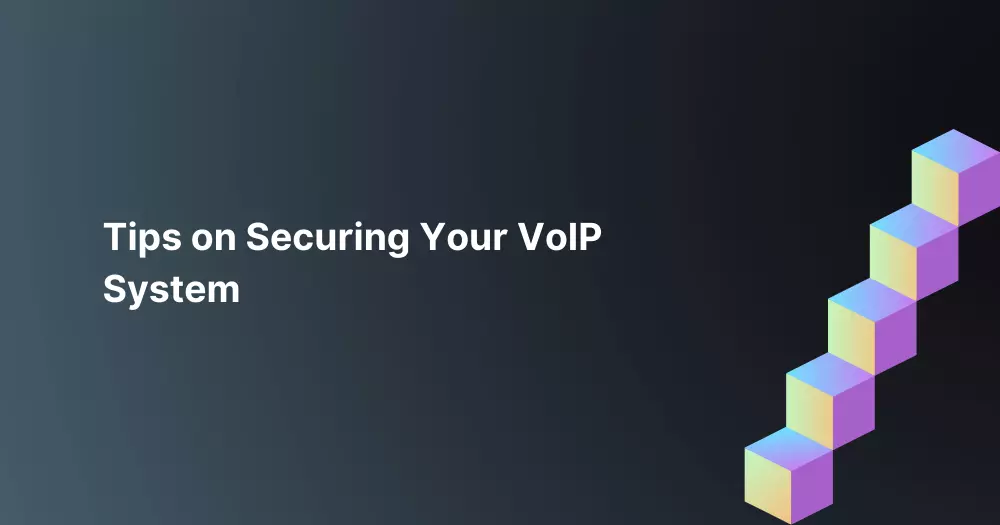
Many businesses use email and instant messaging to communicate with each other. Voice systems allow you to connect with anyone, anytime, and anywhere. VoIP has been popular in the previous years due to its economic pricing among big or small businesses. It opened new streams of opportunities with its advanced features aside from being able to choose a payment plan that suits your business.
As businesses adopt VoIP as a lucrative communication solution, will it introduce new security risks in the organization? The answer is yes. VoIP is internet-based. The network environment of VoIP is susceptible to attacks that extend beyond spamming and eavesdropping.
Cybercriminals may use VoIP as an entry point to your business network. That’s why security protection is a must for every cloud-based service that’s plugged into your business.
Protecting your voice network is much like protecting a data network. Organizations need to be meticulous in overseeing IT management and security requirements.
It’s important to remember that when you install VoIP, critical business conversations are occurring over ISP networks and internet backbones. While some “phreakers,” as phone hackers are called, are simply hobbyists looking for a way to get free long-distance service, other VoIP security threats come from malicious actors. Many hackers plan to steal either your bandwidth, customer data, or proprietary information.
There are many ways that VoIP security can be threatened by a phreaker:
The web is a virtual playground for attackers who constantly search for potential victims and fine-tune their craft to launch new attacks. Depending on the gravity of the methods used, a SANS Institute paper identifies the following common threats:
Call eavesdropping, recording, and voicemail tampering breach the users’ privacy by leaking sensitive information or compromising corporate secrets. Attackers can then resort to blackmail and extortion.
The telltale signs of worms, viruses, and DoS are service outages that degrade service quality such as the inability to open files or get a connection. The goal of these threats is to disrupt services–forcing the business to pay a ransom to restore operations.
Faking authenticity through registration and caller ID spoofing is another method hackers use to create chaos. Toll fraud and data theft are two of the most dreaded threats that can cost companies financial losses as well as the leakage of critical business information.
VoIP administrators should also be wary of warning signs. A sudden spike in the volume of calls in unlikely area codes could indicate hackers have successfully breached the network. Other signs are fake antivirus messages where there is an enterprise-grade antivirus program in place, mysteriously activated microphones, webcams, other hardware, and unofficial changes to internet settings.
No company can completely eliminate every risk associated with VoIP security, and addressing these items comprehensively would require additional staff and monitoring resources. That’s why many companies that use a hosted VoIP system appreciate the security services that come with their subscription:
Take the following tips to ensure seamless collaboration on your VoIP system.
Ensure your network infrastructure is safe and secure through an evaluation. Getting it evaluated makes sure that your network switch is brought up to date to accommodate and optimize voice signals. Voice signals now travel the same lines as data. It is important that all should be assessed to continuously experience high-level quality calls and voice functionality.
Having control over your administration is crucial for protection. Setting up a firewall and an intrusion prevention system (IPS) helps monitor and filter authorized and unauthorized VoIP traffic, and track unusual voice activities. This allows you to control incoming and outgoing traffic on the VoIP network the same way as they do for other web-based traffic—giving your VoIP a firm foundation for security.
VoIP calls are transmitted over the Internet unencrypted, which allows malicious hackers to intercept data packets and record calls. A virtual private network (VPN) helps enhance VoIP security by encrypting voice traffic and mitigating the threat of an attacker using a network analyzer to capture the data.
Leaving the default admin password or using a weak password makes your VoIP at risk. Default VoIP passwords are publicly available. Immediately changing the default password to a strong password adds another layer of protection. The key aspects of a strong password are length (the longer the better), a combination of letters (upper and lower case), numbers, symbols, no ties to personal information, and no dictionary word.
Begin by creating and implementing a policy about your voice solution across your organization. One of the best ways to protect your organization from cybercriminals is to ensure that your end-users are educated about potential risks. Communicating your VoIP’s security features gives your end-user a working knowledge on how to prevent or respond to the situation.
Given the rise in cyberattacks, bandits are still on the run exploiting VoIP vulnerabilities and weaknesses.
Take it to the next level. Learn how to make your voice communications work in a secure environment. Contact us for more details.